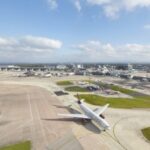Supply chain bottlenecks, shortages of critical components, and logistical hurdles have collectively hindered the efficient functioning of aviation networks, impacting both manufacturing and operational aspects of the industry.
Dr Mark Hiller, CEO of RECARO Aircraft Seating and RECARO Holding, spoke to FINN about navigating these challenges.
FINN: What supply chain challenges are companies such as RECARO facing in 2024?
Dr Mark Hiller: Demand is heavily increasing due to ramp-up of volumes and lead times are often under pressure as airlines want a quick turnaround for refurbished cabins and other updates.
The current geopolitical tensions have resulted in ever-evolving availabilities and lead times, as well as complex supply chains; in that same vein, international shipping routes continue to be disrupted (e.g. Suez canal, shortages in capacity at ports).
FINN: What tools do you have to address these challenges?
MH: RECARO has facilities located around the world, which helps us be close to customers and supplier bases.
Our sourcing and production involves a high degree of “local for local”, which focuses on leveraging local resources, short transport routes, and reduced packaging costs.
RECARO has built a global flexible production network, meaning the same seat can be produced at multiple production sites to optimise lead times and production lines.
We have curated strong relationships with suppliers thanks to effective and continuous communication. Another major part of our strategy is forecasting, especially on raw materials.
FINN: Has RECARO fully recovered from COVID?
MH: RECARO announced post-pandemic record growth of almost 55% in 2022. In alignment with the industry’s recovery at the end of 2023, RECARO had a strong year and reached breakeven status for the first time since 2020.
We anticipate continued significant growth for 2024; on a global scale we have ambitious growth targets, which we were able to meet or beat especially in 2018 and 2019 prior to the pandemic.
An important part of our recovery strategy involved retaining our team members at our headquarters in Schwaebisch Hall, which was successfully accomplished with a Beschäftigungssicherung (job security) agreement
FINN: After the last couple of years, are you in a better position now to deal with any further crises?
MH: A crisis for a company, as demanding as it is, at the same time is huge learning curve to being prepared for a next crisis.
RECARO, as a family owned company, the strategy set-up is long-term and most importantly envisions and makes sure to be sustainable for the next 5-10 years.
FINN: What can we expect from RECARO over the next 12 months?
MH: Thanks to the long-term vision of RECARO leadership at the start of the pandemic, we laid a foundation for several new developments, which are now coming to fruition.
Our newest E/C LR seat, the CL3810, will be flying in Q2 for the first time. We also anticipate our PL3810 setting the benchmark in the Premium cabin.
The CL6720 is highly competitive in the business class market segment, thanks to its lightweight design, and we continue to build out innovation competencies, while also ramping up our in-house testing capabilities (crash test facility, flame lab).
From a sustainability perspective, RECARO is optimising the R Sphere economy class seat concept. First unveiled at AIX 2023, the concept is built from recyclable materials, including cactus, cork, wood and recycled fishing nets.
Subscribe to the FINN weekly newsletter

